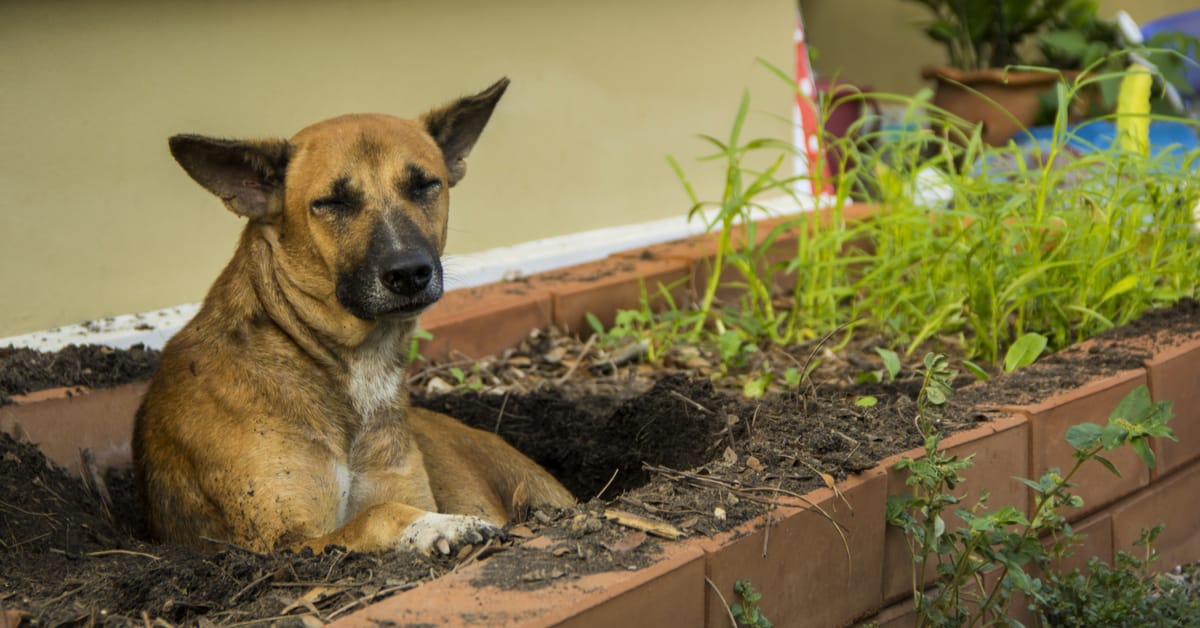Is your dog constantly digging up your flower beds, leaving behind a messy yard? This common behavior can be frustrating for pet owners who want to maintain beautiful gardens.
Dogs may dig for various reasons, including boredom, stress, or a natural instinct to explore.
However, with a bit of patience and some strategic techniques, you can deter your dog from turning your flower beds into their personal digging grounds.
By understanding why your dog digs and implementing a few simple solutions, you can protect your garden and ensure your dog stays happy and healthy.
Here, how to wash dog bedding in washing machine?
How to keep your dog from digging in the flower bed?
To keep your dog from digging in the flower bed, start by addressing the root cause of the behavior. Dogs often dig due to boredom, anxiety, or a need for attention.
Ensure your dog gets plenty of exercise and mental stimulation through daily walks, playtime, and interactive toys to reduce boredom. If anxiety is the issue, provide a calm environment, or consider using calming products like pheromone diffusers.
Another effective method is to create boundaries. You can use physical barriers such as fencing, chicken wire, or decorative rocks to prevent access to the flower bed.
Additionally, sprinkle the area with safe deterrents, such as citrus peels, vinegar, or a commercial repellent, which dogs find unpleasant.
Training is also essential. When your dog starts digging, redirect them with a command like “no” and guide them to an appropriate digging spot. Positive reinforcement for good behavior can help reinforce the desired action.
What smell repels dogs from digging?
Several smells can repel dogs from digging in unwanted areas, including flower beds. Citrus scents, such as orange, lemon, or lime, are known to deter dogs because most dogs dislike the strong, tangy aroma. You can use citrus peels or make a homemade spray by mixing water with citrus juice.
Another scent that repels dogs is vinegar, which has a strong odor that dogs tend to avoid. A mixture of white vinegar and water can be sprayed on the areas you want your dog to stay away from.
Other scents that may deter digging include eucalyptus, peppermint, or cayenne pepper. You can create a spray using essential oils or sprinkle the dry ingredients around your flower beds.
However, it’s important to ensure the substances you use are safe for your dog and plants. Always test a small area first to avoid any damage to your garden.
What is the best deterrent for dogs digging?
The best deterrent for dogs digging combines behavioral training, physical barriers, and scent-based repellents.
First, ensure your dog receives sufficient exercise, mental stimulation, and attention, as boredom or anxiety are common causes of digging. Providing interactive toys, daily walks, or play sessions can help redirect their energy.
Physical barriers, like a fence or chicken wire buried a few inches under the soil, are effective in preventing access to flower beds. You can also create designated digging areas, like a sandbox, and encourage your dog to use it instead.
Here, dogs spread bed bugs?
Scent-based repellents, such as citrus peels, vinegar, or commercial sprays designed to deter digging, can be sprinkled around the garden. These smells are unpleasant to dogs and can make your flower bed less appealing.
Consistent positive reinforcement for good behavior and redirecting digging to appropriate areas can reinforce the desired habits, making it the best long-term solution for most dogs.
Do coffee grounds stop dogs from digging?
Coffee grounds can be an effective deterrent for dogs digging, as they have a strong, bitter smell that many dogs find unpleasant. When sprinkled around flower beds or areas where your dog tends to dig, coffee grounds can make the spot less appealing.

Additionally, coffee grounds are natural and safe for most dogs, though they should be used in moderation.
The scent may discourage your dog from digging, but it’s important to remember that this method may not work for all dogs, as some may not be bothered by the smell.
If you use coffee grounds, ensure that you mix them into the soil rather than simply sprinkling them on top, as this will help the scent last longer and keep the grounds from being blown away.
Combining this method with other deterrents, such as physical barriers and training, will provide the best chance of stopping your dog from digging.
How to deter dogs from digging in flower beds?
To deter dogs from digging in flower beds, start by addressing the root cause, such as boredom or anxiety. Ensure your dog gets plenty of physical exercise and mental stimulation through daily walks, playtime, and interactive toys. This helps reduce the urge to dig out of boredom.
If your dog is digging due to anxiety or stress, provide a calm environment and consider using calming products like pheromone sprays.
You can also make the flower bed less appealing by using natural deterrents. Dogs dislike the smell of citrus, vinegar, or strong spices like cayenne pepper.
Sprinkling these around the garden or using a citrus-based spray can help deter digging. Additionally, create physical barriers, such as chicken wire or a low fence, to prevent access to the flower bed.
Finally, reinforce good behavior by providing designated digging areas, like a sandbox, and rewarding your dog for using it instead of your flower bed.
Here, why my dog scratches his bed?
15 Ways to deter dogs from digging in flower bed
1. Provide Plenty of Exercise and Mental Stimulation
Dogs often dig due to boredom or pent-up energy. Ensure your dog gets sufficient physical and mental exercise daily.
A lack of activity can lead to destructive behaviors like digging, so regular walks, play sessions, and training can tire them out and reduce the urge to dig.
Engage your dog with puzzle toys or scent games that challenge their minds. Regular exercise helps keep them healthy and happy while preventing unwanted behaviors in the garden. Interactive toys like treat-dispensing puzzles can keep your dog entertained for hours, so they are less likely to dig for attention or stimulation.
Additionally, varying the activities will prevent your dog from becoming bored with the same routine.
2. Create a Designated Digging Area
Instead of discouraging digging altogether, you can give your dog a designated digging spot, like a sandbox or a specific corner of the yard.
This approach lets them satisfy their natural digging instincts while protecting your flower beds.
By consistently redirecting them to the designated area when they start digging in the wrong place, your dog will learn where it’s acceptable to dig. Make the new digging area attractive by burying toys or treats to encourage them to dig there.
This positive reinforcement will help them understand that digging in the sandbox is acceptable, while digging in the flower bed is not. Over time, your dog will associate the sandbox with digging and leave your garden undisturbed.
3. Use Physical Barriers
Installing physical barriers around your flower beds is one of the most effective ways to stop your dog from digging.
You can use a simple fence or chicken wire to block access to the area. Bury the chicken wire a few inches into the soil to prevent your dog from digging underneath.
You can also use large rocks or garden edging to make the area less accessible. If your dog is persistent, consider creating a taller barrier or using garden fencing that is difficult for them to climb over.
Physical barriers not only stop digging but also prevent your dog from running into the flower bed altogether, protecting both your garden and your dog’s safety.
4. Apply Natural Deterrents
Natural deterrents like citrus peels, vinegar, and essential oils can help repel dogs from digging in flower beds.
Dogs dislike the smell of citrus fruits, so placing orange or lemon peels around your garden can act as a natural repellent. Additionally, spraying a mixture of vinegar and water or using essential oils like eucalyptus or peppermint can make the area unpleasant for dogs.
Here, why does my spayed dog hump his bed?
These scents irritate dogs’ sensitive noses, causing them to avoid the area. Be cautious, however, as some essential oils may be harmful to pets, so always dilute them properly.
Regularly reapply these deterrents, especially after rain, to ensure continued effectiveness.
5. Use Commercial Repellents
Commercial dog repellents are widely available and can be used to deter digging. These products often contain ingredients that dogs find unpleasant, such as citronella or spicy scents.
Spray the repellent directly onto your flower bed or areas where your dog tends to dig. Many repellents are designed to be safe for plants and pets when used as directed. Look for a repellent that is non-toxic and designed specifically for outdoor use. Reapply the product after rain or when you notice the scent fading.
Combining commercial repellents with other techniques, such as physical barriers and behavioral training, will give you the best results.
6. Redirect Digging Behavior with Commands
Teaching your dog basic commands like “no” or “leave it” can be highly effective in stopping unwanted digging behavior. When your dog starts digging in the flower bed, use the command to interrupt the behavior.
Immediately guide them away from the bed and direct them to a more appropriate activity, like fetching a ball or playing with a toy. Reward them with treats and praise when they follow your instructions and stop digging.
Consistency is key—each time they start to dig, reinforce the command and reward positive behavior. Over time, your dog will learn to associate the “no” command with digging and avoid doing it in the future.
7. Add Texture to the Soil
Changing the texture of the soil in your flower bed can make it less appealing for your dog to dig. Dogs tend to prefer soft, loose soil for digging, so adding rocks, pine cones, or mulch to the soil can deter them.
These materials create a rougher surface that is uncomfortable for dogs to dig through.
You can also try spreading a layer of coarse gravel or pebbles on top of the soil. Not only does this discourage digging, but it can also help with drainage and make your flower bed look more attractive.
When combined with other deterrents, such as physical barriers or scent repellents, textured soil provides an effective solution to keep your dog out of your garden.
8. Use Motion-Activated Sprinklers
Motion-activated sprinklers can be a highly effective and humane way to keep your dog away from your flower bed. These sprinklers detect movement and emit a burst of water, which startles the dog but doesn’t harm them.
Dogs quickly associate the sound of water with the flower bed and are likely to avoid the area in the future.
Motion-activated sprinklers are adjustable and can be set to spray water only when your dog is close to the flower bed, ensuring minimal water waste. These devices are a great solution for keeping dogs out of gardens without the need for harsh chemicals or physical barriers.
9. Cover the Flower Bed with Netting
Covering your flower bed with netting or bird mesh is another effective way to prevent your dog from digging. The netting acts as a physical barrier that your dog can’t easily get through.

Here, why do dog mess up their bed?
Choose a fine mesh or netting that is tough and won’t tear under pressure. Spread the netting over the soil and secure it around the edges, ensuring it covers the entire bed. You can also anchor the netting with stones or garden stakes to keep it in place.
This method is particularly useful if your dog is persistent and tends to dig right through barriers. As your plants grow, the netting can be removed, making way for your garden to flourish.
10. Train Your Dog to Stay Out of the Garden
Training your dog to stay out of your flower bed is a long-term solution that requires consistency and patience. Start by setting clear boundaries and using commands like “leave it” or “stay” whenever your dog approaches the garden. When your dog obeys, reward them with praise or a treat.
If they dig in the flower bed, calmly redirect them to a more appropriate activity, such as playing in a designated digging spot.
Over time, your dog will learn to associate the flower bed with negative consequences and the training will help reinforce the behavior you want. Consistent training and positive reinforcement are key to modifying your dog’s behavior.
11. Socialize Your Dog with Other Dogs
Sometimes dogs dig due to social factors, such as loneliness or a need for attention. Socializing your dog with other dogs can help alleviate some of the anxiety that leads to digging.
Regular playdates or visits to the dog park allow your dog to interact with other dogs, providing mental stimulation and a chance to burn off excess energy. This helps reduce the stress or boredom that can lead to digging.
Socialization can also help your dog learn how to behave appropriately in various environments, including your garden.
It’s essential to monitor the interactions and ensure your dog is comfortable and not feeling threatened by the presence of other dogs.
12. Remove Attractive Items from the Flower Bed
Dogs may dig in flower beds if they smell something interesting or see something they want to explore.
If you notice your dog digging in a particular spot, check to see if there are any buried items or smells that may be attracting them. Sometimes, decomposing food, buried bones, or even interesting smells from the soil can encourage digging. Remove any attractants from the area to discourage further digging.
You can also use repellents, such as citrus or vinegar, to mask or eliminate any lingering odors. By making the flower bed less enticing, you reduce the likelihood of your dog digging in that area.
13. Use Positive Reinforcement
Positive reinforcement is a powerful tool in modifying behavior. When your dog avoids digging or behaves appropriately in the yard, reward them with treats, praise, or a favorite toy.
By reinforcing good behavior, your dog will learn that staying away from the flower bed leads to positive outcomes. Conversely, when they dig, redirect them to an acceptable area, but avoid punishing them. Positive reinforcement helps strengthen the desired behavior and can be far more effective than negative consequences.
The key is consistency—every time your dog behaves appropriately, they should receive a reward. Over time, your dog will develop a positive association with staying out of the flower bed.
14. Supervise Your Dog Outdoors
Sometimes the best way to prevent your dog from digging in your flower bed is to supervise them while they’re outside.
By keeping an eye on your dog, you can intervene as soon as they start to dig and redirect them to an appropriate activity.
If you’re unable to supervise your dog constantly, consider using a leash or harness to maintain control while they’re outdoors.
You can also designate a specific area for your dog to roam, such as a fenced yard or a sectioned-off part of your garden, where digging is allowed. Direct supervision not only helps prevent digging but also strengthens your bond with your dog and gives you the opportunity to reward them for good behavior.
15. Provide a Comfortable Outdoor Space
Ensure your dog has a comfortable outdoor space where they feel safe and secure. Dogs may dig if they are uncomfortable, hot, or seeking shelter. By providing shade, water, and a cozy resting spot, you help meet your dog’s basic needs.
Consider setting up a shaded area with a dog bed or blanket, or build a doghouse where they can retreat when they need a break. If your dog is digging due to discomfort or a desire to escape the sun, creating a comfortable outdoor space can reduce the need for them to dig in the flower bed.
Home remedy to keep dogs out of flower beds
A simple home remedy to keep dogs out of flower beds is to use a mixture of natural ingredients that dogs find unpleasant.
One effective solution is a blend of citrus, vinegar, and water. Dogs typically dislike the scent of citrus, so you can scatter orange or lemon peels around your flower bed. Additionally, mixing equal parts vinegar and water in a spray bottle and applying it to the soil or the edges of the flower bed can deter digging.
The sour smell of vinegar irritates dogs’ noses and discourages them from approaching the area. Another option is to use cayenne pepper or chili powder, which gives off a spicy scent that dogs tend to avoid.
These remedies are safe, non-toxic, and inexpensive, but they should be reapplied regularly, especially after rain, to maintain their effectiveness.
Fencing to keep dogs out of flower beds
Fencing is an effective and practical solution to keep dogs out of flower beds. A simple garden fence or barrier can block access to the flower bed, preventing your dog from digging or running through it.
Opt for low, sturdy fences that are tall enough to discourage jumping and made of materials like wood, vinyl, or metal. For added security, bury the bottom of the fence a few inches into the soil to prevent your dog from digging underneath it.
You can also use chicken wire or mesh fencing, which is lightweight and easy to install, while still providing a solid barrier. If you prefer a less visible option, consider using decorative barriers or garden edging that blend in with the landscape.
Ensure the fence is tall enough to prevent dogs from climbing over and check for weak spots regularly. This method is reliable, low-maintenance, and long-lasting for keeping dogs out of your garden.
Best dog digging repellent
The best dog digging repellents are natural, safe, and effective. A popular option is citrus-based sprays, as dogs strongly dislike the smell of citrus fruits.
You can make a homemade repellent by mixing water with lemon or orange juice and spraying it on areas where your dog digs. Another effective repellent is vinegar, which has a sharp odor that deters dogs.
Combine vinegar with water in a spray bottle and apply it to flower beds or spots your dog frequents.
Commercial repellents are also available, containing ingredients like citronella or capsaicin, which dogs find unpleasant. Look for non-toxic, pet-safe options to avoid harming your dog or plants.
Additionally, cayenne pepper sprinkled around the flower bed can be effective, but be cautious to avoid irritation.
Whatever repellent you choose, remember to reapply it regularly, especially after rain, to maintain its effectiveness. Combining repellents with training and physical barriers will yield the best results.
Best dog repellent for flower beds
The best dog repellent for flower beds combines natural ingredients and pet-safe formulas. One effective solution is citrus-based repellents, as dogs dislike the strong smell of citrus fruits.
You can create a homemade repellent by mixing water with lemon or orange juice and spraying it around your flower bed. Another effective option is vinegar, which has a pungent odor that dogs find unpleasant. Dilute vinegar with water in a spray bottle and apply it regularly to the areas your dog tends to dig.
Commercial repellents, such as those containing citronella, peppermint, or eucalyptus oils, are also effective at deterring dogs from flower beds.
These scents irritate dogs’ noses and encourage them to avoid the area. For a non-scent-based deterrent, motion-activated sprinklers can startle dogs when they approach, discouraging them from digging.
Reapply repellents regularly, especially after rain, to maintain their effectiveness and protect your flower beds.
Will mothballs keep dogs out of flower beds
Mothballs are often suggested as a dog deterrent, but they are not a safe or effective long-term solution.
While the strong odor of mothballs may repel dogs initially, they pose serious health risks.
Mothballs contain naphthalene or paradichlorobenzene, both of which are toxic to dogs. Ingesting even small amounts can lead to poisoning, causing symptoms like vomiting, diarrhea, lethargy, and in severe cases, organ damage or death. Furthermore, the fumes from mothballs can irritate a dog’s respiratory system.
Due to these health hazards, mothballs are not recommended for keeping dogs out of flower beds. Safer alternatives include natural repellents like citrus, vinegar, or commercial dog-safe deterrents.
Fencing, motion-activated sprinklers, and training are also more reliable and long-lasting solutions. Always prioritize your dog’s safety and well-being when considering any deterrents for your garden.
Stop dog from digging home remedy
A simple home remedy to stop your dog from digging is using a mixture of natural ingredients that dogs dislike. One effective remedy is creating a spray with citrus, as dogs generally dislike citrus smells.
You can mix lemon or orange juice with water in a spray bottle and apply it to the areas where your dog digs. Additionally, vinegar mixed with water can be another option, as the pungent odor deters dogs from digging.
Another method is sprinkling cayenne pepper or chili powder around the flower bed or garden, which will make the area unpleasant for your dog.
You can also try burying chicken wire just below the soil’s surface in the digging zones; the texture and resistance will discourage digging.
Finally, providing your dog with a designated digging area, such as a sandbox, may help redirect their behavior, satisfying their instinct to dig in a controlled space.
How to keep pets out of potted plants
Keeping pets out of potted plants can be challenging, but there are several effective methods to protect your plants. One option is to create a physical barrier by placing decorative stones or pebbles on top of the soil.
Pets are less likely to dig through the rough texture and may be discouraged from disturbing the plant.
You can also try placing a piece of chicken wire or mesh over the soil and under the plant’s leaves to prevent your pet from accessing the soil. Another deterrent is to use scents that pets dislike, such as citrus, lavender, or eucalyptus oils.
You can spray a diluted solution of essential oils around the pot or place orange peels on top of the soil. Additionally, training your pets to avoid the plants with positive reinforcement can be effective. Finally, consider elevating your plants to a higher surface that is out of your pet’s reach.
How to keep dogs from digging in mulch
To keep dogs from digging in mulch, start by using deterrents that dogs find unpleasant. One effective method is to sprinkle cayenne pepper or chili powder over the mulch.
The strong scent will discourage your dog from digging. Another natural option is citrus, as dogs dislike the smell of oranges and lemons. You can place orange peels in the mulch or spray the area with a diluted mixture of water and citrus juice.
Vinegar is also a good option; mix equal parts vinegar and water in a spray bottle and apply it to the mulch.
For a physical deterrent, place chicken wire just beneath the mulch to prevent your dog from digging through the surface. Additionally, ensure your dog has plenty of stimulating activities and exercise to reduce the urge to dig. Training your dog with positive reinforcement to avoid the area can also help discourage the behavior.
Related faq’s
How can you keep dogs out of flower beds without hurting them or damaging anything that is there already (i.e., fencing)?
To keep dogs out of flower beds without harming them or damaging the plants, use non-toxic, gentle deterrents. One option is applying a natural citrus spray.
Dogs dislike the smell of citrus, so mix water with lemon or orange juice and lightly spray the flower bed. Another effective method is to sprinkle cayenne pepper or chili powder around the edges, as dogs find the spicy scent unpleasant, but it’s harmless.
You can also place sharp-textured materials like pinecones, gravel, or large stones on the soil surface. These are uncomfortable for dogs to walk or dig through but won’t harm the plants.
Motion-activated sprinklers are another humane solution, startling the dog with a burst of water when they approach.
Additionally, training and positive reinforcement can be powerful tools; reward your dog for staying out of the flower bed and offer alternatives, like a designated digging area.
How do I stop my dog from digging and pulling plants out?
To stop your dog from digging and pulling plants out of your garden, begin by providing alternative outlets for their energy and instincts.
Make sure your dog gets plenty of exercise, both mentally and physically, to reduce the urge to dig. Designating a specific digging area, like a sandbox, can satisfy their digging instinct in a controlled space.
Next, use deterrents around your plants.
Citrus scents are effective, as dogs dislike the smell of lemon or orange peels. You can also spray a diluted mixture of vinegar and water on the soil or use cayenne pepper, which dogs find unpleasant.
Another option is placing large stones or a mesh covering like chicken wire around the plants to make it more difficult for your dog to access them. Consistent training with positive reinforcement, rewarding your dog for avoiding the plants, can also help curb the behavior over time.
How do I keep my dogs out of my flowerbed?
To keep your dogs out of your flowerbed, start by creating barriers that are both effective and gentle. One option is to use physical deterrents, such as placing decorative stones, mulch, or pinecones on top of the soil. The rough texture will discourage your dog from digging.
Another solution is to install low, non-intrusive fencing around the flowerbed to prevent access. You can also place chicken wire just below the surface of the soil to prevent digging without damaging your plants. Additionally, use natural repellents like citrus, vinegar, or cayenne pepper.
Dogs generally dislike the smell of citrus fruits, so you can scatter orange or lemon peels around the bed or spray a citrus solution on the soil. Motion-activated sprinklers can startle dogs if they approach the area. Finally, ensure your dog has a designated space for digging and engage them in activities to reduce boredom.
How can I get my dog to stop digging and stop leaving sizable craters all over our yard?
Create an alternative space for digging, such as a sandbox, where your dog can safely dig. Encourage them to use this designated area by burying treats or toys inside.
You can also use deterrents like citrus peels, vinegar, or cayenne pepper around the yard. These scents are unpleasant for dogs and will discourage them from digging.
For a physical barrier, try placing chicken wire under the soil or using rocks to cover the area. Finally, training and positive reinforcement, like rewarding good behavior, can help reinforce boundaries and stop the digging habit over time.
How to protect plants from being dug up by dog
To protect your plants from being dug up by your dog, consider a combination of deterrents and preventive measures.
Start by using natural repellents like citrus peels, vinegar, or cayenne pepper around your plants. Dogs dislike the strong scent of citrus, and the spiciness of cayenne pepper will deter them from digging in those areas.
You can also physically protect your plants by placing decorative stones, mulch, or pinecones on top of the soil. This creates a rough surface that’s uncomfortable for your dog to dig through.
Additionally, bury chicken wire a few inches below the surface of the soil to discourage digging without harming your plants.
Another option is to use small garden fences or barriers around your plants, keeping your dog out of the area. Finally, make sure your dog has an alternative digging space, like a sandbox, to redirect their behavior and satisfy their digging instincts.
Dog digging in garden.
If your dog is digging in your garden, it’s important to address the behavior with both preventive and corrective measures.
Dogs dig for various reasons, including boredom, anxiety, or a desire to explore.
Begin by providing sufficient physical exercise and mental stimulation to tire your dog out and reduce the urge to dig. Interactive toys, puzzle games, and regular playtime are great ways to keep your dog engaged.
To protect your garden, consider using natural deterrents like citrus peels, vinegar, or cayenne pepper around the plants.
Dogs tend to dislike the strong scents of citrus and spicy substances, making them less likely to dig in the area.
Additionally, use physical barriers such as low fences, chicken wire, or decorative stones to prevent access to certain parts of the garden. You can also designate a specific digging area, like a sandbox, to satisfy your dog’s instinct to dig in a controlled environment.
Need ideas on how to keep a dog from jumping in and digging up the soil?
To keep your dog from jumping in and digging up the soil, there are several effective methods to try. First, provide plenty of physical exercise and mental stimulation.
Dogs often dig when bored or anxious, so daily walks, play sessions, and interactive toys can help reduce the urge.
Next, create a designated digging area, such as a sandbox, and encourage your dog to dig there by burying toys or treats.
You can also use natural deterrents like citrus peels, vinegar, or cayenne pepper sprinkled around the garden, as dogs dislike these smells.
Physical barriers such as chicken wire, garden fencing, or rocks on the soil surface can also prevent access to your garden and stop digging.
Finally, consider using motion-activated sprinklers to startle your dog when they approach the area. Consistently reinforcing good behavior with treats and praise can also help break the digging habit over time.
My 10 month old puppy always digs in our garden. How do I get rid of that habit?
To stop your 10-month-old puppy from digging in the garden, you first need to understand why it’s happening. Puppies often dig due to boredom, excess energy, or a natural instinct to explore. Start by providing more exercise and mental stimulation.
Daily walks, playtime, and interactive toys will help tire out your puppy and reduce the urge to dig.
Create a designated digging area, such as a sandbox, where your puppy is allowed to dig. Encourage them to use this space by burying toys or treats.
You can also deter digging in the garden by using natural repellents like citrus peels, vinegar, or cayenne pepper, as dogs dislike these smells.
For physical barriers, use chicken wire, rocks, or mulch on the soil surface to make it harder for your puppy to dig.
Training with positive reinforcement is key—reward your puppy for not digging and redirect them to acceptable behaviors. Consistency and patience will help break the habit.
Any ideas on how to stop my dogs from digging here?
To stop your dogs from digging, it’s important to address the root causes and implement effective strategies.
First, ensure your dogs receive plenty of physical exercise and mental stimulation. Regular walks, playtime, and interactive toys can help alleviate boredom, which is often a key reason for digging.
Create an alternative digging space, like a sandbox or designated area, where your dogs are encouraged to dig.
Bury toys or treats there to attract them to the spot. If they continue to dig in the wrong areas, use natural deterrents such as citrus peels, cayenne pepper, or vinegar around the dug-up spots—dogs dislike these smells.
You can also physically block access to certain areas by placing chicken wire, large rocks, or mulch over the soil.
Motion-activated sprinklers are another option to startle your dogs when they approach the area. Finally, consistent training with positive reinforcement will help redirect their behavior.
Conclusion
To deter dogs from digging in flower beds, it’s essential to create a consistent approach that combines training, physical barriers, and deterrents.
Start by redirecting your dog’s behavior with positive reinforcement when they avoid the flower bed. Consider using natural deterrents like citrus peels, vinegar, or commercial sprays that are unpleasant for dogs but safe for plants. Installing fences or using raised flower beds can physically prevent access.
Additionally, providing dogs with alternative digging areas, such as a designated sandbox, can satisfy their instinct to dig. Patience and consistency are key to successful prevention.






